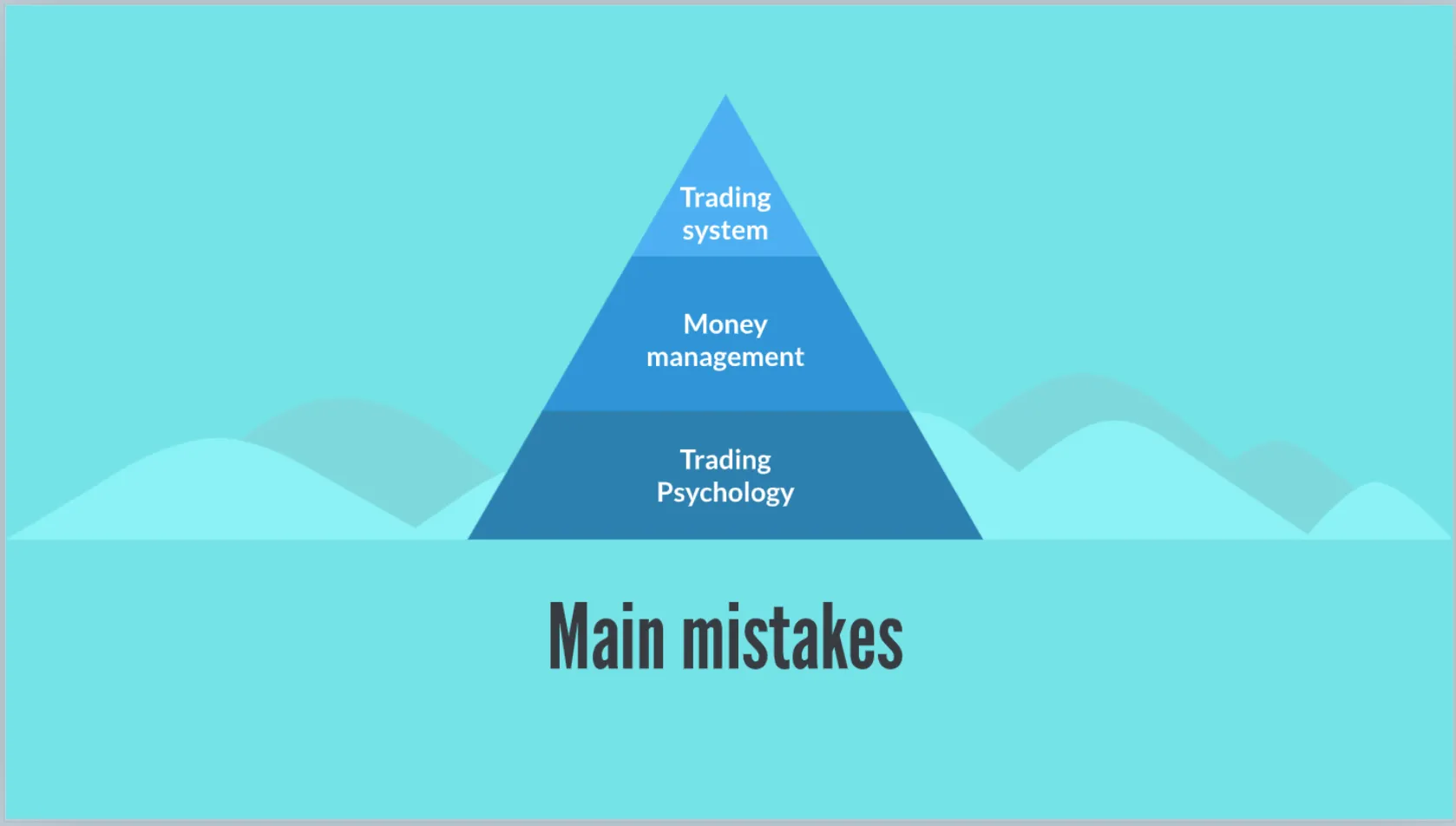В торговом процессе начинающие трейдеры могут совершать разные ошибки.

Все ошибки можно условно разделить на 3 отдельные группы:
- Те, что связаны с торговой системой, её применением и построением.
- Те, что связаны с управлением капиталом.
- Те, что связаны с психологией.
Ошибки с торговой системой
Старт без тестов
Первой ошибкой является то, что торговый метод, по которому заключаются сделки, не проходит полноценное тестирование.
Чтобы точнее судить о прибыльности торгового метода, нужно провести полноценное тестирование торговой системы. Это можно сделать с помощью специальных программ, способных проводить тестирование на основе исторических данных.
Кроме того, можно посмотреть на график в торговой платформе и записать оптимальные моменты продажи и покупки соответственно своему торговому методу. После того как у вас будет больше, чем 200 данных виртуальных сделок – появится статистика, с помощью неё можно будет определить такие главные характеристики торговой системы:
- Убыток или прибыль;
- Доходность за период тестирования;
- Число убыточных или прибыльных сделок;
- Максимальная просадка по стратегии.
Систему лучше не применять, если она не может заработать на подобном историческом тестировании. На данном этапе отсеивается множество вариантов систем, которые не работают. Часто роковой ошибкой трейдера является то, что он начинает использовать торговую систему, которая ему понравилась, но не делает историческое подробное тестирование по ней.
Неправильный инструмент
Следующий тип ошибок – это неправильный выбор торгового инструмента. На ликвидные бумаги ориентируются почти все торговые системы. Если применить систему на бумаге, которая не имеет высокой ликвидности, то можно сильно пострадать. Это значит, что на старте деятельности на фондовом рынке нужно отдавать предпочтение бумагам с высокой ликвидностью. Бумаги с низкой ликвидностью будут интересны лишь тем, кто использует специальные торговые системы под них.
Отклонение от торгового плана
Часто бывает, что правила системы попросту не соблюдаются. Торговля без системы даёт худшие результаты даже чем не продуманная торговая система с качественным и дисциплинированным применением.
Ошибки с управлением капиталом

Ещё одной группой ошибок является та, что связана с управлением капиталом.
Увеличение объёмов
В данной группе самая частая ошибка – сильное превышение разумного кредитного плеча. Обычно это происходит так. На старте торговой карьеры многие участники рынка соблюдают правила управления капиталом и не собираются превышать допустимое торговое плечо. Но после нескольких удачных сделок правила управления капиталом перестают соблюдаться и плечо используется по максимуму. Часто это и есть причиной плохих результатов.
Неправильные «стопы»
Также множество ошибок связаны с тем, что трейдер ошибочно выставляет стоп-заявки. Конечно плохо, что нет математически выверенного способа для постановки стоп-заявок. Трейдеру приходится идти на компромисс во время принятия решения по «стопу». Слишком близкая к текущей котировке (короткая) стоп-заявка часто приводит к тому, что позиция закрывается случайным движением рынка. А при слишком далёкой к текущей котировке (длинной) стоп-заявке получается редкое срабатывание, но большой убыток для трейдера.
Поэтому во время установки «стопа» трейдер должен выбирать между меньшей вероятностью срабатывания стоп-заявок с высоким потенциальным риском или большей вероятностью случайного срабатывания с низким риском на сделку. Чаще всего стоп-заявки устанавливаются за ближайший минимум или максимум цены. Данный подход помогает эффективно свести до минимума вероятность случайного срабатывания.
Усреднение
Частой ошибкой является и усреднение. Многие трейдеры после открытия позиции, которая приносит убыток, через время пробуют открывать такую же позицию и надеются улучшить среднюю цену открытия для данных двух позиций. В некоторых случаях эта тактика может использоваться, но только в таких, когда не превышается допустимый уровень риска.
Если же при усреднении будут использованы кредитные ресурсы, то такая тактика будет очень рискованной. С одной стороны, накапливается риск. Тогда, как с другой – ухудшается математическое ожидание. В случае если тенденция против открытой ранее позиции держится долго, то обычно эта позиция заканчивается тем, что срабатывает маржин-колл (критический уровень убытков, когда брокер закрывает сделки трейдера).
Ошибки, которые связаны с психологией

Большинство ошибок связаны с психологией человека. Парадокс заключается в том, что трейдеры даже если знают о психологических ошибках, то всё равно продолжают их совершать.
Попытки отсрочить убыток
Самой опасной психологической ошибкой является попытка пересидеть убыток.
Часто бывает, когда трейдер правильно анализирует рынок, открывает позиции и выставляет заявки, а потом видит приближение цены к стоп-заявке. Затем он снимает или передвигает «стоп» подальше. Это сильно ухудшает параметры статистики, ведь потери от этого становятся только больше. А если движение против открытой позиции будет длиться очень долго, то можно добиться огромных убытков. Но особенность психики человека в том, что она каждый раз находит «разумные» причины для передвижения стопа.
Многие хотят отодвинуть неблагоприятный исход во всех сферах жизни. Время, когда срабатывает стоп-заявка, всегда неприятное. Множество трейдеров при этом ожидают разворот цены. Цена и вправду часто может разворачиваться, а позиция становится прибыльной. Но когда-то рынок не развернётся, а убыток при этом может быть огромным. Обычно нежелание фиксировать убытки являются причиной потери огромных денег.
Преждевременное закрытие
Другим типом ошибок психологии является преждевременная фиксация прибыли. Чаще всего это происходит, когда после открытия позиции происходит движение рынка, которое приносит быструю небольшую прибыль. Много трейдеров не дожидаются запланированной прибыли и фиксируют полученную. Если вы будете всегда фиксировать небольшую прибыль, то снизите математическое ожидание. Если такой метод применять систематически – это негативно скажется на доходности. Такую ошибку чаще делают те, кто не имеет достаточной выдержки или боится убытков.
Этот вид ошибок не так опасен, как нежелание фиксировать убытки, но всё равно его нельзя часто повторять.
Следование за короткими движениями
Следующим типом психологических ошибок чаще всего «страдают» холерики. Эта ошибка в основном случается в период быстрого изменения цен. Новички в данной ситуации пытаются открывать позиции в сторону движения цены, отбрасывая правила управления капиталом. Позиция часто открывается в сторону движения рынка, ведь вышеупомянутые люди получают магнетическое воздействие от графика. Такая ошибка обычно не приводит к катастрофическим последствиям, но в случае её частого повторения можно нарушить торговую систему и в конце концов получить убытки.
Системность и дневник трейдера
Собственная торговая система является универсальным лекарством ото всех трейдерских ошибок. Это не всегда легко, ведь бывает время, когда трейдер должен подождать благоприятного времени для открытия позиций. Но даже не очень успешная торговая система при долгом и дисциплинированном применении даёт больше прибыли, чем торговля без системы.
Психологические ошибки выделяются желанием самих трейдеров совершить их. Но чем больше человек будет знать о данных ошибках и их причинах, тем легче ему будет в дальнейшем не допустить жадности и страха. Для торговли на бирже очень важным будет ведение своеобразного дневника трейдера.
Когда человек начинает применять торговую систему, то обычно примерно представляет её результат. Чтобы была возможность совершенствования собственной торговли и увеличения прибыльности, нужно фиксировать все свои действия. Но указывать стоит не только моменты, когда заключаются сделки. Необходимо указать причину решения об открытии позиции, почему «стоп» устанавливается в выбранное место и почему прибыль фиксировалась в отдельный момент времени.
Вышеупомянутый дневник поможет анализировать и совершенствовать торговлю.
Самым лучшим способом избегания трейдерских ошибок является последовательное и чёткое следование своей торговой системе.

